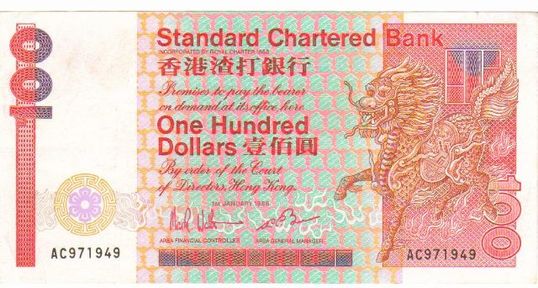|
Today's blog post is about an unusual aspect of noun use in English that many Hong Kong writers are unaware of. it leads to frequent errors in their writing. In English, it's common to put nouns in front of other nouns to qualify them, for example 'brick wall'. Both 'brick' and 'wall' are nouns, but when we put 'brick' in front of 'wall' to qualify its meaning, we are using the word 'brick' almost as if it is a kind of adjective.
Our focus today is on those occasions when we use a *plural* noun in front of another noun as a kind of adjective. This is the usage that is commonly handled incorrectly in Hong Kong. Our picture shows a Hong Kong $100 note. You can see, written on the note in English, the words 'One Hundred Dollars'. No doubt that the word 'dollars' here is plural, right? What happens though when we want to use this plural noun expression in front of another noun, like the noun 'note' for example? Which of the following sentences is correct?
Many Hong Kong writers would select the first of these two sentences. After all, they would say, that's what it stays on the front of the note: ONE HUNDRED DOLLARS. Unfortunately, this is INCORRECT. The reason is that, in English, when we move a plural noun expression in front of another noun to qualify it, the plural expression is changed to singular -- like in the second sentence above ('one hundred dollar'). This rule applies in pretty much every case where a plural noun expression -- especially one that includes a number -- is placed in front of another noun to qualify it (like an adjective). She went on a holiday for five days.
I have a schedule of 10 interviews to handle.
The journey was 200 kilometres
The rule applies also for plural nouns that are not formed in the traditional way by adding -s, like 'children': The bus has special seats for children
In summary: if you are putting a plural noun expression in front of another noun to qualify it, then the plural noun must normally be turned into a singular noun.
4 Comments
KH
9/3/2017 10:25:41 pm
How about 'listening skills training' instead of 'listening skill training'?
Reply
Simon
10/3/2017 05:01:41 am
That's a good question, and touches on something I haven't mentioned in this blog post -- the difference between countable and uncountable nouns in these kinds of pre-modifying expressions.
Reply
Louis
8/6/2017 04:14:29 pm
How about "year old"?
Reply
Simon
8/6/2017 06:40:35 pm
Hi Louis, thanks for your question. Although your sample sentences look similar to the types of sentences I am talking about in this post, they are actually not the same. The word 'old' is not a noun but an adjective in both cases, and when we put '10 years' in front of 'old' it becomes an adjective phrase. Put simply, when the adjective phrase is separate from the noun it describes (as in your first example), use the plural form of the noun -- 'The boy is ten years old'. However, if you bundle the adjective phrase IN FRONT of the noun it describes, you have created a compound noun phrase, and in this case the noun 'year' is put in the singular form (as described in the blog post above). So we would say "He is a ten year old boy', not 'he is a ten years old boy'. Notice that we also need to have an article in here. Sometimes in this sort of sentence, the noun is dropped out and you will see sentences like "He is a ten year old". It's important to remember that this is a short form of the full form, 'ten year old boy'. Other examples -- The wall has red bricks / It is a red brick wall. She is 2 metres tall / She is a two metre tall woman. I hope that helps!
Reply
Your comment will be posted after it is approved.
Leave a Reply. |
About this blogThis blog arises from keeping an eye on English in Hong Kong. I often use signs, notices and advertisements that I see as starting points to write about English issues that commonly challenge Hong Kong writers. Archives
October 2017
Categories
All
|


 RSS Feed
RSS Feed